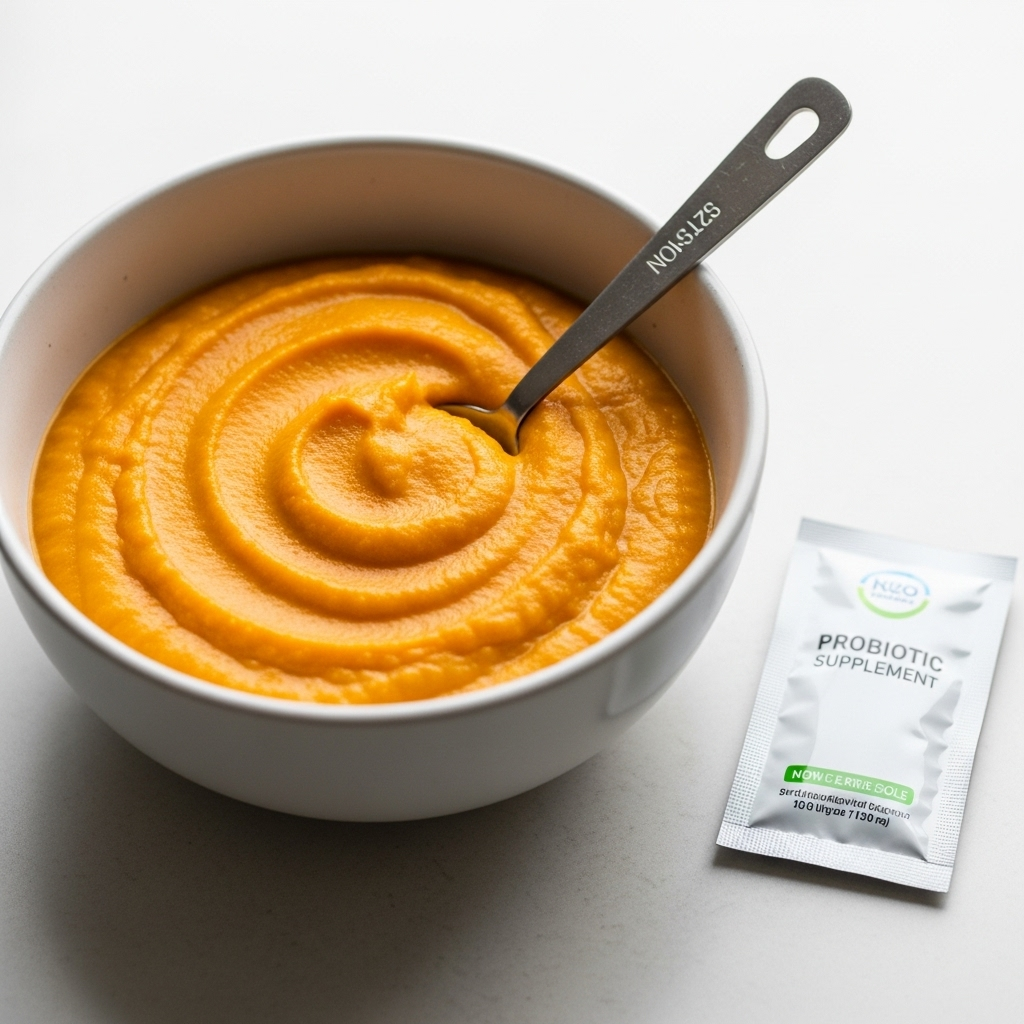Pumpkin + Probiotics for Occasional Dog Diarrhea

Many dog owners reach for home remedies when their pet has a loose stool. Two commonly recommended options are plain canned pumpkin and a quality probiotic formulated for dogs. Used appropriately, these can help support gut recovery for mild, short-lived diarrhea. This article explains how each works, safe ways to use them together, practical dosing guidelines, and when to get veterinary care.
How pumpkin helps with mild diarrhea
Pumpkin (plain 100% pumpkin puree, not pumpkin pie filling) is a dietary source of soluble and insoluble fiber, water, and nutrients. For occasional diarrhea it can help by:
- Adding soluble fiber, which absorbs excess water in the intestinal tract and can bulk up loose stools.
- Supporting regular motility—fiber helps normalize both loose stools and constipation when used appropriately.
- Being gentle, bland, and usually easy to mix into a dog’s regular food.
Important: do not use spiced or sweetened pumpkin pie filling. The added sugar and spices can worsen GI upset.
How probiotics can support recovery
Probiotics are live microorganisms that, when given in adequate amounts, may help restore a healthy balance of gut bacteria. For dogs with mild, non-complicated diarrhea, certain probiotic strains have been shown to:
- Compete with harmful bacteria and help rebalance the intestinal microbiome.
- Support normal digestion and immune function in the gut.
- Potentially shorten the duration of mild diarrhea in some cases.
Some strains commonly used in canine products include specific strains of Lactobacillus, Bifidobacterium, and Enterococcus faecium. Effectiveness varies by strain and product formulation; choose a probiotic specifically labeled for dogs and follow the manufacturer’s instructions or your veterinarian’s guidance.
Using pumpkin and probiotics together: practical steps
- Confirm the situation is appropriate for home care: the dog is alert, drinking, not vomiting repeatedly, and shows only mild, occasional diarrhea (see “When to see a vet” below).
- Start with plain canned pumpkin: common dosing guidelines are roughly:
- Small dogs (under ~15 lbs): 1 teaspoon to 1 tablespoon per meal
- Medium dogs (15–50 lbs): 1–2 tablespoons per meal
- Large dogs (over 50 lbs): 2–4 tablespoons per meal
These are general recommendations—start low and monitor stool consistency. Too much fiber can cause constipation or worsen GI upset.
- Begin a probiotic formulated for dogs at the label-recommended dose. If the product provides colony-forming units (CFU), follow manufacturer guidance or your vet’s instruction. Many veterinarians recommend giving probiotics daily for several days to a couple of weeks during recovery.
- Mix pumpkin into your dog’s regular food; give probiotics either mixed into food or as directed by the product. Some probiotics are best given with food to protect organisms from stomach acid, but follow the label.
- Monitor hydration and stool. If stool improves within 24–72 hours and your dog stays bright and hydrated, continue the supportive plan until stools normalize. If there is no improvement or the dog worsens, contact your veterinarian.
Choices: plain pumpkin, yogurt, or supplements?
Plain canned pumpkin is a convenient fiber source. Plain, unsweetened yogurt or kefir containing live cultures may be helpful for some dogs but can cause problems if your dog is lactose intolerant. Only use small amounts of plain, unsweetened yogurt and avoid artificial sweeteners (xylitol). Probiotic supplements designed for dogs typically contain specific strains and doses optimized for pets and are often more reliable than human products.
Safety, risks, and what to avoid
- Do not use pumpkin pie filling or spiced pumpkin — sugar and spices can irritate the gut and be toxic in some cases.
- Avoid human probiotic capsules unless advised by a vet; dog-specific products often have strains and dosing meant for canines.
- Introduce fiber gradually to avoid causing constipation; if stools become hard, lower or stop pumpkin and consult your vet.
- If your dog has an underlying medical condition (e.g., pancreatitis, inflammatory bowel disease, recent antibiotics), check with your veterinarian before adding pumpkin or a probiotic.
| Pros | Cons |
|---|---|
|
|
When to see a veterinarian
Home care with pumpkin and a dog probiotic is suitable for mild, occasional diarrhea in an otherwise healthy, active dog. Seek veterinary care promptly if you notice any of the following:
- Diarrhea lasting more than 24–48 hours or getting worse
- Repeated vomiting, blood in stool, or black/tarry stool
- Signs of dehydration (dry gums, decreased skin elasticity, sunken eyes)
- Fever, severe lethargy, or abdominal pain
- A puppy, senior dog, or a dog with underlying illness
How to choose a probiotic for your dog
Look for products:
- Formulated specifically for dogs and clearly labeled with strain names and CFU counts
- From reputable manufacturers with clear storage instructions (some require refrigeration)
- With veterinarian or pet nutritionist guidance if your dog has health issues or takes antibiotics
Remember that probiotic benefits are strain-specific; a product that works for one dog may not work the same for another.
FAQ
1. Can I feed my dog pumpkin every day?
Small amounts of plain canned pumpkin can be given daily in moderation, especially for fiber support. Use the dosing guidance above and monitor stool—don’t overdo it to avoid constipation or extra calories.
2. Is pumpkin safer than Pepto-Bismol or other OTC human remedies?
Pumpkin is a gentle food-based approach and is often safer than giving human medications without veterinary approval. Some human meds are unsafe for dogs. Always consult your vet before using over-the-counter drugs.
3. How long until I see improvement?
For mild cases, you may see improvement within 24–72 hours. If there’s no improvement in that time frame, or your dog shows concerning signs, contact your veterinarian.
4. Can probiotics cause side effects?
Most dog probiotics are well tolerated, but some dogs may experience mild gas or temporary changes in stool as the gut flora adjusts. Stop use and consult your vet if you see worsening symptoms.
Key Takeaways
- Plain canned pumpkin and a dog-specific probiotic can be useful for mild, occasional diarrhea.
- Use conservative pumpkin doses and follow probiotic label instructions or your vet’s advice.
- Avoid spiced pumpkin pie filling and products with artificial sweeteners like xylitol.
- Monitor your dog closely; seek veterinary care for severe, persistent, or complicated cases.
- Choose probiotic products formulated for dogs and containing identified strains and dosing information.
Disclaimer: This information is for educational purposes and does not replace veterinary advice. If your dog is very young, elderly, pregnant, has underlying health conditions, or shows severe symptoms (vomiting, blood in stool, dehydration, high fever, or marked lethargy), contact your veterinarian promptly. Always check with your vet before starting new supplements or home remedies, particularly if your dog is on medications.

Leave a Reply